| Srl | Item |
| 1 |
ID:
107222
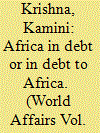

|
|
|
| 2 |
ID:
018040
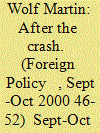

|
|
|
|
|
| Publication |
Sept-Oct 2000.
|
| Description |
46-52
|
|
|
|
|
|
|
|
|
|
|
|
|
|
|
|
| 3 |
ID:
126925
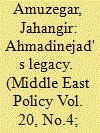

|
|
|
| 4 |
ID:
118170
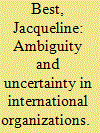

|
|
|
|
|
| Publication |
2012.
|
| Summary/Abstract |
How do international organizations deal with the persistent challenge of uncertainty? The most intuitive answer is through regulation. Yet, rules are not always the best solution in times of uncertainty or in dealing with complex and diverse problems. More ambiguous policies that leave room for interpretation, can often be more functional for an international organization (IO); moreover, ambiguities can also be a source of power-and are therefore often a subject of conflict among institutional actors. Focusing on the case of International Monetary Fund conditionality policy, this article provides several key insights into IO practices. It provides an account of the different forms that ambiguity can take in international organizations and develops an explanation for why institutional ambiguities appear and persist. Looking inside the IO black box, the study examines how interests, institutional culture, and legitimacy concerns shape actors' support for ambiguity, and how these preferences combine with broader structural factors to produce a predisposition toward institutional ambiguity. Finally, this article points toward certain implications of organizations' tendency toward ambiguity, suggesting that this may play an important role in enabling institutional expansion.
|
|
|
|
|
|
|
|
|
|
|
|
|
|
|
|
| 5 |
ID:
141369
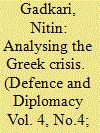

|
|
|
| 6 |
ID:
120547
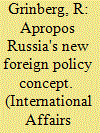

|
|
|
|
|
| Publication |
2013.
|
| Summary/Abstract |
THE FAST CHANGING international situation requires Russia's flexible and timely reaction to the new challenges and threats to its security that arise in the process of the constant evolution of the entire system of modern international relations. At the same time, the Russian Federation, too, is in the process of transformation; it is acquiring new possibilities for an effective response to these challenges and threats; the structure of its national security interests is changing, which should find its reflection in Russia's new foreign policy concept. It is therefore not surprising that among the first decrees V.V. Putin signed after his inauguration as the president of Russia is the decree "On Measures to Ensure the Realization of the Russian Federation's Foreign Policy Course" that instructed the RF Foreign Ministry to present a new draft of the RF foreign policy concept. This will be the country's fourth foreign policy concept since the disintegration of the USSR 21 years ago.
|
|
|
|
|
|
|
|
|
|
|
|
|
|
|
|
| 7 |
ID:
107065
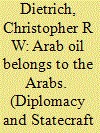

|
|
|
|
|
| Publication |
2011.
|
| Summary/Abstract |
Drawing from material in American and British national archives, the Johnson and Nixon presidential libraries, the archives of the International Monetary Fund, and the United Nations record, this article examines the international politics surrounding the June 1972 nationalisation of the Iraq Petroleum Company. The response to the nationalisation reveals a complex relationship between traditional Cold War concerns and the emergence of a Third World challenge to the structure of the post-war international economy: the practice of raw material sovereignty. Although Soviet aid to the Ba'ath government was central to nationalisation, it was far from exclusive. Accordingly, the nationalisation illustrates the dynamism of the Cold War era and places on display important forces that operated independently of Cold War constraints.
|
|
|
|
|
|
|
|
|
|
|
|
|
|
|
|
| 8 |
ID:
107213
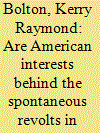

|
|
|
| 9 |
ID:
053181
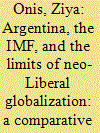

|
|
|
| 10 |
ID:
095163
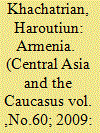

|
|
|
|
|
| Publication |
2009.
|
| Summary/Abstract |
The world crisis interrupted the stable economic growth Armenia had been enjoying for the past fifteen years. Progressive development began in 1994, whereby between 2001 and 2007 the growth indices reached double digits. In 2008, the increase in GDP came to a halt due to the Russian-Georgian war and amounted to only 6.8%. And as early as the first six months of 2009, the GDP began to decrease, dropping as low as 16.3% compared to the same period of the previous year, which is one of the worst indices for the entire CIS. In July, the drop in GDP amounted to 18.7%, which encouraged people to think that the crisis had bottomed out.
|
|
|
|
|
|
|
|
|
|
|
|
|
|
|
|
| 11 |
ID:
112276
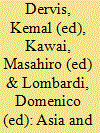

|
|
|
|
|
| Publication |
Washington, D C, Brooking Institution Press and Asian Development Bank Insititute, 2011.
|
| Description |
viii, 200p.
|
| Contents |
Includes bibliographical references and index.
|
| Standard Number |
9780815704218
|
|
|
|
|
|
|
|
|
|
|
|
Copies: C:1/I:0,R:0,Q:0
Circulation
| Accession# | Call# | Current Location | Status | Policy | Location |
| 056410 | 337.5/DER 056410 | Main | On Shelf | General | |
|
|
|
|
| 12 |
ID:
001695
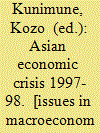

|
|
|
|
|
| Publication |
Tokyo, Institute For Developing Economies, 1999.
|
| Description |
75p.
|
|
|
|
|
|
|
|
|
|
|
|
Copies: C:1/I:0,R:0,Q:0
Circulation
| Accession# | Call# | Current Location | Status | Policy | Location |
| 041266 | 338.95/KUN 041266 | Main | On Shelf | General | |
|
|
|
|
| 13 |
ID:
065642
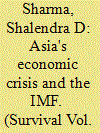

|
|
|
|
|
| Publication |
1998.
|
| Description |
p.27-52
|
|
|
|
|
|
|
|
|
|
|
|
|
|
|
|
| 14 |
ID:
127982
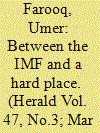

|
|
|
| 15 |
ID:
046457
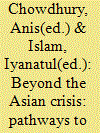

|
|
|
|
|
| Publication |
Cheltenham, Edward Elgar, 2001.
|
| Description |
xiii,373p.
|
| Standard Number |
1840642734
|
|
|
|
|
|
|
|
|
|
|
|
Copies: C:1/I:0,R:0,Q:0
Circulation
| Accession# | Call# | Current Location | Status | Policy | Location |
| 045339 | 338.95/CHO 045339 | Main | On Shelf | General | |
|
|
|
|
| 16 |
ID:
068680
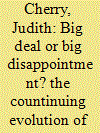

|
|
|
| 17 |
ID:
122842
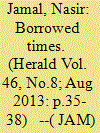

|
|
|
| 18 |
ID:
117026
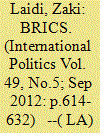

|
|
|
|
|
| Publication |
2012.
|
| Summary/Abstract |
The BRICS' impact can be evaluated based on the degree of political coherence among them, as well as their capacity to influence the international system. This article will from the outset assume that the BRICS form a heterogeneous coalition of often competing powers that share a common fundamental political objective: to erode Western hegemonic claims by protecting the principle which these claims are deemed to most threaten, namely the political sovereignty of states. The BRICS form a coalition of sovereign state defenders. While they do not seek to form an anti-Western political coalition based on a counter-proposal or radically different vision of the world, they are concerned with maintaining their independence of judgment and national action in a world that is increasingly economically and socially interdependent. They consider that state sovereignty trumps all, including, of course, the political nature of its underpinning regimes. Thus, the BRICS - even the democratic ones - fundamentally diverge from the liberal vision of Western countries.
|
|
|
|
|
|
|
|
|
|
|
|
|
|
|
|
| 19 |
ID:
140621
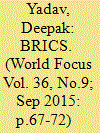

|
|
|
|
|
| Summary/Abstract |
There is no question that this institution will pose as a rival to the Bretton Woods Institutions. The bigger danger for the dollar is the reality that other emerging states that want to break from the conditional ties of the IMF can benefit from the NDB and CRA. The BRICS states make up more than a quarter of the Global GDP and holds less than 11 per cent of the voting rights in the IMF. The United States holds over 16.8 per cent of the voting power in the IMF and along with the countries of Britain, France, Germany and Italy control over 34 per cent of the vote of the IMF. After the crash of Wall Street in 2008 there were efforts by the BRICS group to restructure the World Bank and the IMF to increase the influence of China and other BRICS societies. Wall Street could not countenance this restructuring because the dominance of the Bretton Woods Institutions ensured the military management of the international system in so far as the poorer countries of the world had to keep their reserves in dollars and the US could finance its expenditures from the hard earned savings of other peoples. The BRICS formation will now give the poorer societies a greater say in the international financial order.
|
|
|
|
|
|
|
|
|
|
|
|
|
|
|
|
| 20 |
ID:
140617
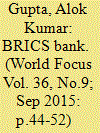

|
|
|
|
|
| Summary/Abstract |
International economic order has always remained biased and discriminatory on account of ‘balance of trade’ being always in favour of developed world. The difference between the developed and the underdeveloped countries grew sharper with the rolling of years in the post-second world war era. While the developed countries made further progress, the condition of under-developed countries did not show any improvement. Consequently, the hiatus between the developed and the under-developed countries went on increasing. The developing countries attributed this to the prevalent international economic order established with the instrumentalities of General Agreement on Tariffs and Trade (GFTT), the International Monetary Fund (IMF), and the International Bank for Reconstruction and Development (World Bank or IBRD).
|
|
|
|
|
|
|
|
|
|
|
|
|
|
|
|